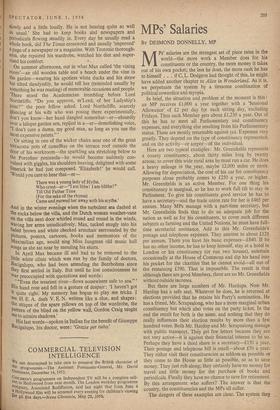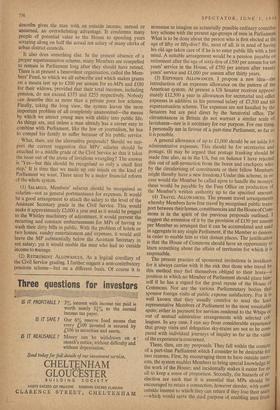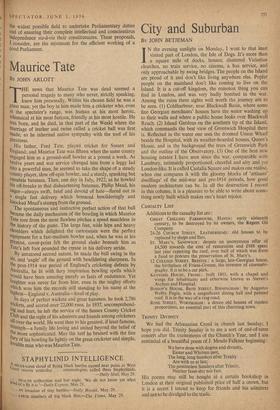MPs' Salaries
BY DESMOND DONNELLY, MP MPs' salaries are the strangest set of piece rates in the world—the more work a Member does for his constituents or the country, the more money it takes out of his own pocket; the less he does, the more cash he has to himself . . . if CAL. Dodgson had thought of this, he might have added another chapter to Alice in Wonderland. As it is, we perpetuate the system by a tiresome combination of political cowardice and myopia.
In brief, the situation and problem at the moment is this : an MP receives £1,000 a year together with a 'Sessional Allowance' of £2 per day for each sitting day, excluding Fridays. Thus each Member gets about £1,230 a year. Out of this he has to meet all Parliamentary and constituency expenses, and everything else resulting from his Parliamentary status. These are mostly returnable against tax. Expenses vary greatly. They depend on the type of constituency represented, and on the activity—or torpor—of the individual.
Here are two typical examples : Mr. Greenfields represents a county constituency, about thirty miles long by twenty across; to cover this wide rural area he must run a car. He does a heavy mileage in the year, maybe 12,000 miles or more. Allowing for depreciation, the cost of his car for constituency purposes alone probably comes to £250 a year, or higher. Mr. Greenfields is an active Member. For one thing his constituency is marginal, so he has to work full tilt to stay in Parliament. To give his constituents good service he has to have a secretary—and the trade union rate for her is £465 per annum. Many MPs manage with a part-time secretary, but Mr. Greenfields finds that to do an adequate job for the nation as well as for his constituents, to cover such different subjects as farming and the United Nations, he must have full- time secretarial assistance. Add to this Mr. Greenfields's postage and telephone expenses. They amount to about £125 per annum. There you have his basic expenses—£840. If he has no other income, he has to keep himself, stay at a hotel in London or his constituency (or run two houses), entertain occasionally at the House of Commons and dip his hand into his pocket for the charities that he cannot avoid—all out of the remaining £390. That is impossible. The result is that although there are good Members, there are no Mr. Greenfields without outside incomes.
But there are large numbers of Mr. Hardups. Now Mr. Hardup has a safe seat. Whatever he ddes, he is ,returned at elections provided that he retains his Party's nomination. He has a friend, Mr. Scrapealong, who has a more marginal urban constituency but which also votes on the party ticket. In the end the result for both is the same, and nothing that they do really influences their election results by more than a few hundred votes. Both Mr. Hardup and Mr. Scrapealong manage with public transport. They get few letters because they are not very active—it is against their financial interest to be so. Perhaps they have a third share in a secretary—£150 a year. Their postage and telephone bill is small—about £50 a year. They either visit their constituencies as seldom as possible or they come to the House as little as possible, so as to save money. They just rub along; they certainly have no money for travel ' and little money for the purchase of books and periodicals. Finally they have no chance to save for retirement. By this arrangement who suffers? The answer is that the country, the constituencies and the MPs all suffer.
The dangers of these examples are clear. The system they describe gives the man with an outside income, earned or unearned, an overwhelming advantage. It condemns many people of potential value to the House to spending years scraping along on half the actual net salary of many clerks of urban district councils.
It also does something else. In the present absence of a proper superannuation scheme, many Members are compelled to remain in Parliament long after they should have retired. There is at present a benevolent organisation. called the Mem- bers' Fund, to which we all subscribe and which makes grants on a means test up to £300 per annum for ex-MPs and £180 for their widows, provided that their total incomes, including pension, do not exceed £375 and £255 respectively. Nobody can describe this as more than a private poor law scheme. Finally, taking the long view, the system leaves the most important problem of all completely unanswered—the means by which we attract young men with ability into public life. As things are, and unless a man already has a career easy to combine with Parliament, like the law or journalism, he has to compel his family to suffer because of his public service.
What, then, are the alternative proposals? Should we sup- port the current suggestion that MPs' salaries should be attached to a middle grade of the Civil Service so that it takes the issue out of the arena of invidious wrangling? The answer is 'Yes—but this should be recognised as only a small first step.' It is time that we made up our minds on the kind of Parliament we want. There must be a major financial reform of the whole system.
(I) SALARIES. Members' salaries should be recognised as salaries—not as general portmanteaux for expenses. It would be a good arrangement to attach the salary to the level of the Assistant Secretary grade in the Civil Service. This would make it approximately £2,000 a year and as it would be pegged to the Whitley machinery of adjustment, it would prevent the recurring and constant embarrassment for MPs of having to wash their dirty bills in public. With the probldm of hotels or two homes, sundry entertainment and expenses, it would still leave the MP substantially below the Assistant Secretary in net salary; yet it would enable the man who had no outside income to manage.
(2) RETIREMENT ALLOWANCES. As a logical corollary of the Civil Service grading, I further suggest a non-contributory pensions scheme—but on a different basis. Of course it is nonsense to imagine an actuarially possible ordinary contribu- tory scheme with the present age-groups of men in Parliament. What is to be done about the person who is first elected at the age of fifty or fifty-five? He, most of all, is in peed of having his old age taken care of if he is to enter public life with a free mind. A suitable arrangement would be a pension payable On retirement after the age of sixty-five of £500 per annum for ten years' service in the House, of £750 per annum after twenty years' service and £1,000 per annum after thirty years.
(3) EXPENSES ALLOWANCES. I propose a new idea—the introduction of an expenses allowance on the pattern of the American system. At present a US Senator receives approxi- mately £12,500 a year in allowances for secretarial and office expenses in addition to his personal salary of £7,500 and his superannuation scheme. The expenses are not handled by the Senators but are paid direct by the Senatorial office. The circumstances in Britain do not warrant a similar scale of lavishness—nor is it necessary for our purpose. For one things I personally am in favour of a part-time Parliament, so far as it is possible. A general allowance of up to £1,000 should be set aside for administrative expenses. This should be for secretaries and postage. (It may be argued that postage franking should be made free also, as in the US, but on balance I have rejected this out of self-protection from the bores and crackpots who• by the circularising of constituents or their fellow Members. might thereby have a new freedom.) Under ,this scheme, in no case would the Member be called upon to handle the moneys: these would be payable by the Fees Office on production of the Member's written authority up to the specified amount. (4) TRAVEL ALLOWANCES. The present travel arrangements whereby Members have free travel by, recognised public trans- port between their homes, constituencies and the House of Com- mons is in the spirit of the previous proposals outlined. 1 suggest the extension of it by the provision of £150 per annum per Member so arranged that it can be accumulated and used in aggregate in any single Parliament, if the Member so desires, in order to enable him to visit distant places. The justification is that the House of Commons should have an opportunity to learn something about the affairs of territories for which it responsible.
The present practice of sponsored invitations is invidious, for it always carries with it the risk that those who travel by this method may feel themselves obliged to their hosts—a position in which no Member of Parliament should place him- self if he has a regard for the good repute of the House of Commons. Nor are the various Parliamentary bodies that sponsor foreign visits at public expense satisfactory. For it is well known that they usually contrive to send the least representative Members of Parliament to the most unsuitable spots; either in payment for services rendered to the Whips or out of mutual admiration arrangements with selected col- leagues. In any case, I can say from considerable experience that group visits and delegation sky-trains are not to be cow• pared with individual journeys of inquiry so far as the value of the experience is concerned.
These, then, are my proposals. They fall within the context of a part-time Parliament which I consider to be desirable for two reasons. First, by encouraging them to have outside inter- ests, the system enables Members to bring special knowledge to the work of the House; and incidentally makes it easier for us all to keep a sense of proportion. Secondly, the hazards of re- election are such that it is essential that MPs should be encouraged to retain a connection, however slender, with some outside interest to which they can return if they lose their seats —which would serve the dual purpose of enabling men front the widest possible field to undertake Parliamentary duties and of ensuring their complete intellectual and conscientious Independence vis-a-vis their constituencies. These proposals, I consider, are the minimum for the efficient working of a good Parliament.




































 Previous page
Previous page